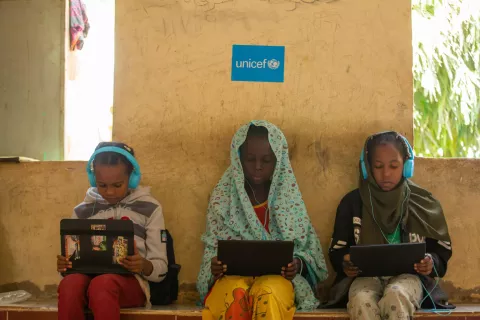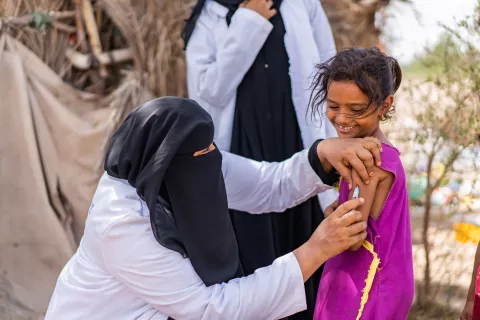In Yemen, a young girl overcomes adversity to excel in school
“I resolved not to allow anyone to treat me badly and to stand up for myself”

- Available in:
- English
- Français
In Yemen, children with albinism often face discrimination and exclusion from their peers, and sometimes from teachers as well. Learn how thirteen-year-old Hosson has gathered strength in the face of adversity, and now excels in school and supports children who have been affected by conflict.
ADEN, Yemen, 1 May 2017 – Thirteen-year-old Hosson is a ninth grade pupil at 26 September School in Malla district, Aden. She is one of the top performing students in her class, and loves to teach younger children maths. But despite her academic success, she is regularly bullied by her classmates. They call her “Al-Barsah”, which means “leper”.
But Hosson does not have leprosy. She was born with albinism, and belongs to the Muhamasheen community, Yemen’s marginalized population. People with albinism commonly have visual problems and need to protect their sensitive skin from the sun. They are often socially ostracized as the condition is misunderstood. Adults and children with albinism in Yemen are vulnerable to ridicule, discrimination and violence, and are less likely to complete schooling, get employment, and find partners to marry.

Hosson and her father sit outside at their home in Malla, Aden. Her father fully supports her and encourages her to continue her studies and help other children in the neighbourhood.
“I know I look different, a bit weird, but is it my fault? This is how God created me,” says Hosson. “But I am just like you. I have feelings. People are always avoiding me. I barely have friends. Only my father understands me, supports me and encourages me to help other children to study in my neighbourhood.”
Her friend and neighbour, Faiza, 12, is one of her few friends.
“Hosson is my friend, and I love her very much. She never scared me because of how she looks. She is always helping me and the other children to study. I know people call her names. It is not fair, it is cruel,” says Faiza.
Hosson is the youngest of nine siblings from a very poor family in Malla district. But she loves school and gets high marks.
“When I went to school for first time, I used to cry when other children bullied me and called me “beast”. Even the teachers, they were so cruel,” says Hosson. “They would ask me to sit in the back of the class as they thought I had a contagious disease.”
But one day, she recalls her father coming to school to speak to the head master and teachers. With tears in his eyes, he pleaded with them to treat her with respect and dignity.
“That day had a major effect on my life as a child,” says Hosson. “That day I resolved not to allow anyone to treat me badly and to stand up for myself.”

Hosson stands outside her home in Malla, Aden. She was born with albinism and has been a victim of bullying and discrimination.
Her enthusiasm to challenge herself and help others led her to becoming involved in a UNICEF-supported emergency programme for children affected by conflict and violence. In 2015, she was one of 50 students in her school selected to participate in training for peacebuilding and psychosocial support through peer education.
“On a weekly basis, along with other trained students, we give session to our classmates on how to communicate effectively, respect each other’s views and differences, build trust and think positively,” says Hosson. “And above all, we learn to seek help when we feel depressed and unhappy.”
Her English teacher, Usstad Gamal, is full of praise for this brave and determined teenager.
“Hosson is a very interesting little girl. She loves studying English and she is doing well,” the teacher says. “She is clever, but she’s often alone and the people around her contributed a lot to her isolation. However, there are some who love her and don’t find her different.”
As for her future, Hosson enjoys her science classes and wants to become a doctor.
“I am not going to give up my dream. I consider myself normal. I might look different but I have the mind to think, learn and study,” she says.
“When I look in the mirror, I see me, only me, Hosson. I will keep looking in the mirror without being sorry or feeling bad. This is how I was created and this is how I will live with it.”



